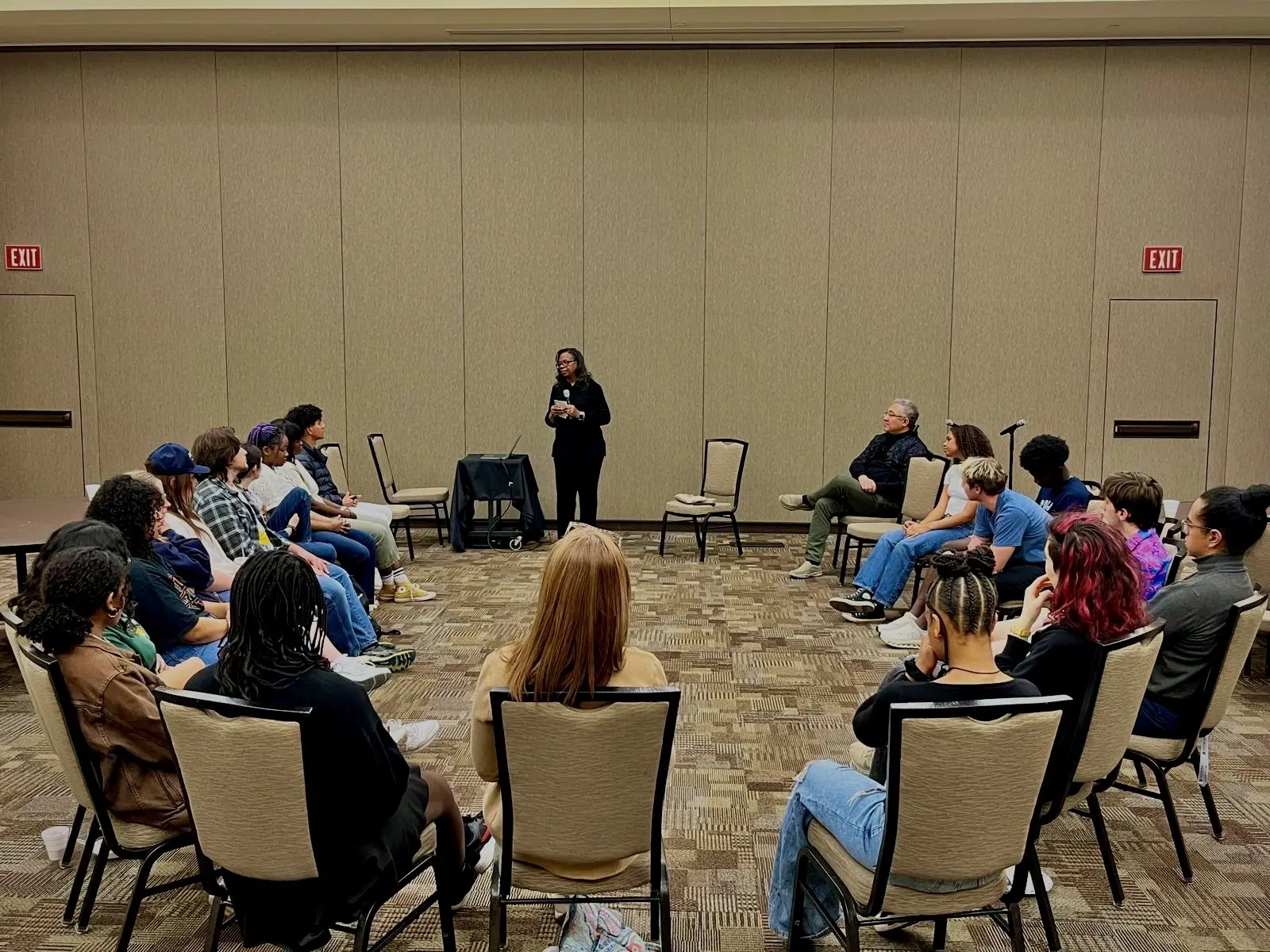![]()
In Genesis 1:27, it is written that “in the image of God he created him; male and female he created them,” to stress the companionship both sexes maintain in their creation. The apostle Paul proclaims, “the Lord woman is not independent of man nor man of woman,” (1 Corinthians 11:11) as a reminder of both being God’s creation and their codependence. CBE International explained that in Romans 16:1-16, Paul congratulates ten individuals as valuable members for their “labors,” to the church with seven of the ten identified as women; yet, he advised, “I do not permit a woman to teach or to assume authority over a man,” (1 Tim. 2:12) when discussing women’s role in the church.
Joshua Wu, a Research Director at Edelman Intelligence, analyzed data about the gender norms from 23,000 self-identified evangelical men using information from the 2020 Nationscape study. Although portions of the Bible discuss gender equality and roles, his 2021 article, “Evangelical men and their views on women,” discovered that “there is strong evidence that evangelical men hold patriarchy and misogyny tendencies if no preferences.” He concluded that half of the evangelical men (56%), “hold one or both of these attitudes,” and nearly 28% believe in both. In contrast, 35% of non-evangelical men surveyed believe in one or both attitudes.
When breaking down the information, Wu assessed these two different attitudes held by evangelical men: their comfort with male or female bosses and the belief that “women who complain about harassment often cause more trouble than they cause.”
First, the report found “evangelical men across all races and ethnicities are more likely to express this patriarchy preference than evangelical women,” with white (41%), Hispanic (39%), Asian (34%) and Black (29%) evangelical men preferring a male over female boss. Second, 49% white, 47% Hispanic, 32% Asian and 31% Black evangelical men “believe women cause more problems than they solve when they speak up.” In contrast, 27% non-evangelical men believe this about women compared to the 45% of evangelical men – creating an 18% separation of the two groups.
Christians respond with confusion
When informed about this separation, Coleman Pringle, a junior mechanical engineering major with a robotics minor at John Brown University, simply expressed how this statistic surprised him. “I would have hoped or expected evangelicals to be a smaller percentage,” he sadly remarked. Pringle agreed this data does reveal a pattern within the church to harbor patriarchal or misogynistic attitudes against women.
Colton Bruza, freshman electrical engineering major at JBU, said, “I believe it is always going to be an issue since we live in a broken society.” Although Bruza acknowledges the generational and culture differences of the past and now, he expressed there are some men in the church who take this harsh view too far into practice or beliefs.
Joey Staton, senior Christian ministry and formation at JBU, stated, “I definitely have [seen it],” and talked about how her cousin, who is a children’s minister, is not allowed in staff meetings because of her gender. She lamented about the “huge disconnect,” and lack of contribution her cousin can make in the church. Staton said it does not always happen in the church, “but, there is an underlying stress as a woman going into a career into the church because of that fear.” She added, “I think that’s the biggest problem, is that all people are made in God’s image and to lessen one person over the other is to lessen, or dampen, a part of God’s image.”
Historical context explained
Under current cultural and societal norms, Christians are understanding and becoming aware to these troubling attitudes, yet remain conflicted – or adamant – about the scripture that pertains to the role women play in the church. As previously mentioned, in 1 Timothy 2:11-15, Paul famously remarks that women are not permitted “to teach or to exercise authority over a man,” which excludes them from holding leadership positions in the church. Thus, causing the conflict of maintaining traditional teachings and progressive ideals to emerge.
In a 2018 article titled “Paul’s View of Women: A Stunning Portrait and Shocking Comments,” the author writes that Paul intended this to be “a temporary restriction, no universal ban,” from this position. Moreover, she states the verb ‘to permit,’ does not mean a universal or permanent ban on the teaching or execution of authority within the church.
“You should look at all writings in context and that is one of the terribly taken out of context passage – in my opinion at least,” Staton affirmed. She explained the context in 1 Timothy as Paul writing to women in that church who strayed from the teachings and started a cult-like teaching of the gospel, which he permits them of doing in the church. She continued, “But that wasn’t like a descriptive for all churches from then on out.” She described the works of women in the church to spread the teachings of the gospel, such as Mary and Mary Magdalene.
Traditional and secular approach
This perspective is contrasted to the secular beliefs that encourages diversity and progressive ideas for women to hold authoritative positions in other institutions. The conflict of traditionalists and modernists values come into conflict again, which does not get easier, thanks to changing centuries worth of beliefs and values.
Bruza stated, “The secular view does not account for the roles of men and women as like in the household. We all have different biology and nature that God gave us. But I can see why that would be an issue because knowing that Christians would that view further than they should rather than the other way.”
Jayne Carr, junior business management major at JBU, expressed how “secular men are going to be more open to changing with the way things have been done.” She continued, “I wish men in the church would be more open to that and I don’t think they are not.” Carr stated “I am not against women in the church, but I believe that men are sometimes superior than women in some ways; Also, women can be dramatic and emotional.” She clarified, “It doesn’t mean that women should be allowed to have positions of authority.”
Staton emphasized, “Men and women are made differently and have different strengths and weaknesses – as a general rule.” Ultimately, she highlighted that men and women are still made in God’s image despite these inherent differences.
Learning from the church’s mistakes
Yet what should be done with this statistical data, negative perceptions and poisonous attitudes some members of the church have? Where is improvement needed to accurately imitate God’s Kingdom?
“There is a way to work within those ideas and still like respect women,” Pringle states. “If you believe that women cannot be elders or pastors, you can still respect them and value them and still want them as a boss.” Pringle continues, “For some people, it may be difficult to understand that but, you’ve got to treat people with the same respect you treat anyone … everyone deserves to be heard and to speak.”
Staton said, “In the most basic way, include women in the conversation.” She continued, “First and for most, they should do their own research and come to their own conclusion about the writing that imply men should be the only leaders. In addition to that, it will never hurt to have women at the table to talk and just have one woman on staff to start.” This inclusion could help these men to understand that women are capable of leadership positions in the church. “I would say he needs to get to know his Creator better and get to know every aspect of God because right now [some] are looking at half of God’s character,” she said.
Jensen Younkman, sophomore mechanical engineering at JBU, affirmed, “There has to be a balance between obeying what the Bible says and treating everyone fairly.” He adds that it is important to correct the actions of people who might get carried away with these harmful traditional values.
Bruza added, “While men and women do have different roles, they are not the role, they are unique individuals. The key is to treat each other as another person, who is going to be different form you but just as valuable.”
“The church needs to come together and put certain procedures to create opportunity for women to serve or be in higher positions of leadership,” Carr said. She states that churches caused these men to believe they are superior to women and advised that women should be equally equipped to match with a male’s leadership capabilities. This can be performed, as she said, through leadership opportunities and proper training to equip them.
Even with generations of cultural progression, it is important for evangelicals to examine and improve the negative beliefs and attitudes held toward women to permit their contribution in leading the church. Past traditions continually adapt to modern norms letting them grow with time and mold it into something equal for both sexes. Biblical traditions can still remain, but the attitudes surrounding those beliefs deserve attention to properly grow as a kingdom and effectively model God’s love unto all His Creation.





